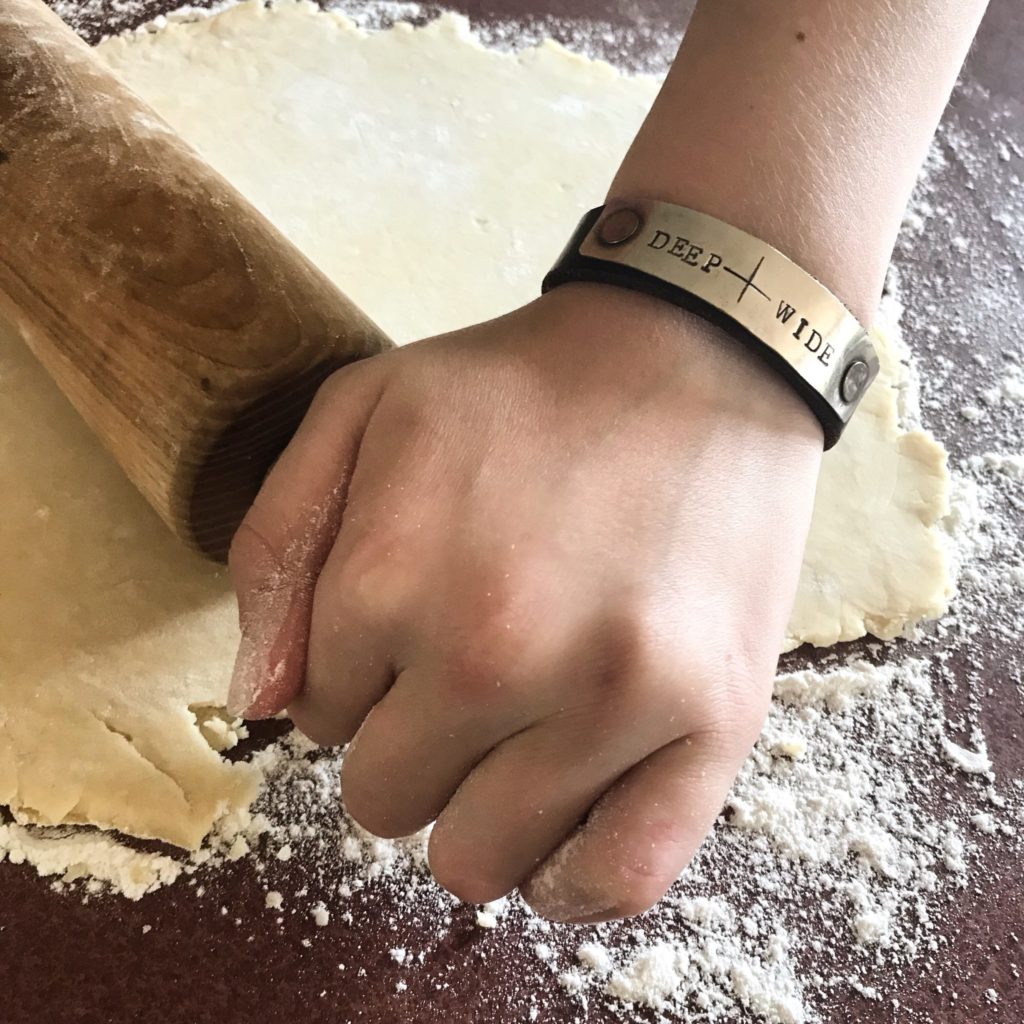A new room, with new walls and new toys and new people. I sat there with little Kav and we both looked around, trying to get our bearings. And I’m terrible at introductions and hate small talk, but so far I was doing okay – there was only one other adult there, we didn’t have any pre-programmed questions we had to ask each other, and the only task at hand was keeping our small children happy.

But I knew it was coming. She was going to ask any minute. We’d already exchanged names, a brief history of ourselves, and laughed over stories about our toddlers.
“So, is he your only child? Or do you have older kids, too?”
There it is, I thought. Here we go. Brace yourself.
“He’s actually our eighth,” I said.
That answer never fails to astonish people, including myself. The stunned look, the huge smile – it happens almost every time. It really is the best, most relatable response.
But it does change the atmosphere. We’re no longer “normal” people, with normal lives, and thus a lot of the “normal” conversation goes out the window – how can you be normal with that many kids? I hadn’t even mentioned adoption or special needs yet.
It’s the first time in 12 years I’ve been in a completely new environment, and feels a little like starting school in a new town. Everything is a blank slate that’s quickly stamped with first impressions. But now, 30 years of (cough) maturity later, I’ve learned to take those impressions with grace and many grains of salt. Preconceived notions usually last only a week or two before people and places take on more than one dimension, and you start to see depth that wasn’t evident at first glance.
A wonderful fact to reflect upon, that every human creature is constituted to be that profound secret and mystery to every other.
– Charles Dickens, A Tale of Two Cities
Back when I was the new kid in school, newness and unfamiliarity seemed like threats to my frail security. But now I know the reverse is true – they are a stretching of my tent pegs and a broadening of my own reach as we let Him lead us in the unknown. And He says, This is how we grow the Kingdom, Love. This is how you keep growing deep and wide.
I’ve just started reading Joshua again and it’s one of my favorites; every time I’m in here it somehow reflects a transition in our lives from wandering to promise.
The only way we get from wandering to promise is through the all-in surrender of obedience, trusting Him in the unknown, scorning the fear that rides shotgun to risk.
It is the Lord who goes before you. He will be with you; he will not leave you or forsake you. Do not fear or be dismayed.
– Deuteronomy 31:8, ESV
I’ve always focused on the do not fear part – I know all about do-not-fear, scorning fear, fighting fear, ignoring fear. I’ve never paid attention to the “or be dismayed” part.
“Dismayed” hasn’t even been in my vocabulary, so I looked it up.
Dismayed: struck with fear, dread, or consternation; being upset, worried, or agitated because of some unwelcome situation or occurrence.
Ohhh. So “dismayed” has been in my vocabulary, and I just didn’t know it.
I’ve been there many times before: the positive pregnancy test, the new diagnosis, the uncontrollable behavior of a broken child. The rug pulled out from under you, the other shoe that drops.
And now, it’s the new walls. The unfamiliar routines and the different ways of doing things. Wondering how long it will take to find our place. Wondering if we have a place. Wondering if we will fit in, or if we will be too weird or too much.
We must not worry about what other people say about us, but we should pay close attention to what we think about ourselves.
– Henry Cloud
Another woman came in shortly later and I successfully practiced social skills again – we exchanged names and an even briefer history, and then she mentioned the women were going to be making blankets next week for a missions project. Would I like to join them?
“Are they knitting?” I mean, it blurted right out before I could stop myself. A little too eager, maybe.
“They’re doing anything,” she said. “Just making blankets. But if you knit, someone donated a ton of yarn to use for that purpose.”
This time I barely restrained myself from asking about the fiber blend of the yarn, the thickness of the gauge, and if they had any good neutral colors…like some deep greys, which would be amazing. Don’t make it weird, I told myself.
So I said, “Oh,” instead. And that was probably weird, too.
In every important way we are such secrets from one another, and I do believe that there is a separate language in each of us, also a separate aesthetics and a separate jurisprudence.
Every single one of us is a little civilization built on the ruins of any number of preceding civilizations, but with our own variant notions of what is beautiful and what is acceptable – which, I hasten to add, we generally do not satisfy and by which we struggle to live.
― Marilynne Robinson, Gilead
But newness is weird. Moving anywhere, whether physical or emotional, feels weird.
The last time we made a big move was to this house — we came here renting and ended up buying; the Lord told us to set some money aside instead of putting it all in our down payment, so we did; we took a month off without pay to practice living out our calling, and the following month He showed us how to use the money we’d set aside to obey that calling full time.
And this feels like that – driven to move, following the pillar of fire, not knowing where He’s going. But we know to watch for Him. And we’re seeing Him in the midst of these new walls.
So we are not holding God to the patterns of the past in our expectations. We’re using those memories of what He’s done in the past to remember that He is always and still doing more for our future. We go from glory to glory, from strength to strength, and we’re meant to live in great expectation of His work and goodness.





